Imagine you are about to embark on a new business venture, and you have found the perfect location for your shop. You can already visualise the products on the shelves, the happy customers browsing, and the steady flow of income. But before you get ahead of yourself, it's important to ensure that your business is built on a solid foundation. That's where a shop rent agreement comes in.
By establishing clear terms and expectations for both you and the landlord, a commercial rental agreement can help protect your business and ensure a smooth and successful venture. In this article, you'll learn all about shop rent agreements and even get details on the format for a shop rent agreement!
Rental Agreement Format for a Shop
It is mandatory to prepare the shop rent agreement with the help of professionals. The terms and conditions can be altered as per the requirements of the tenant and landlord. Normally, the rent agreement is made on a non-judicial stamp paper to make it legally binding.
You can check out the sample rent agreement for a shop here:
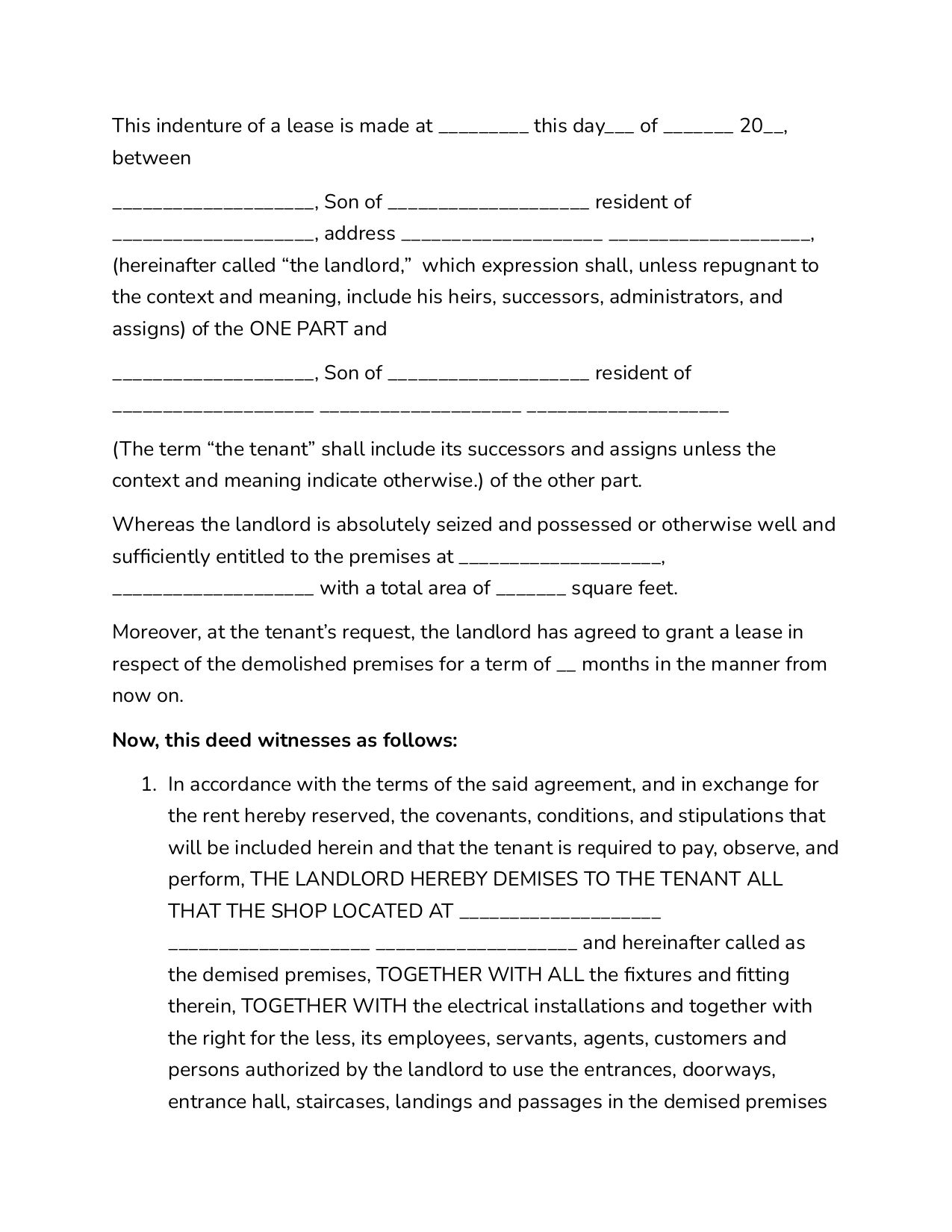
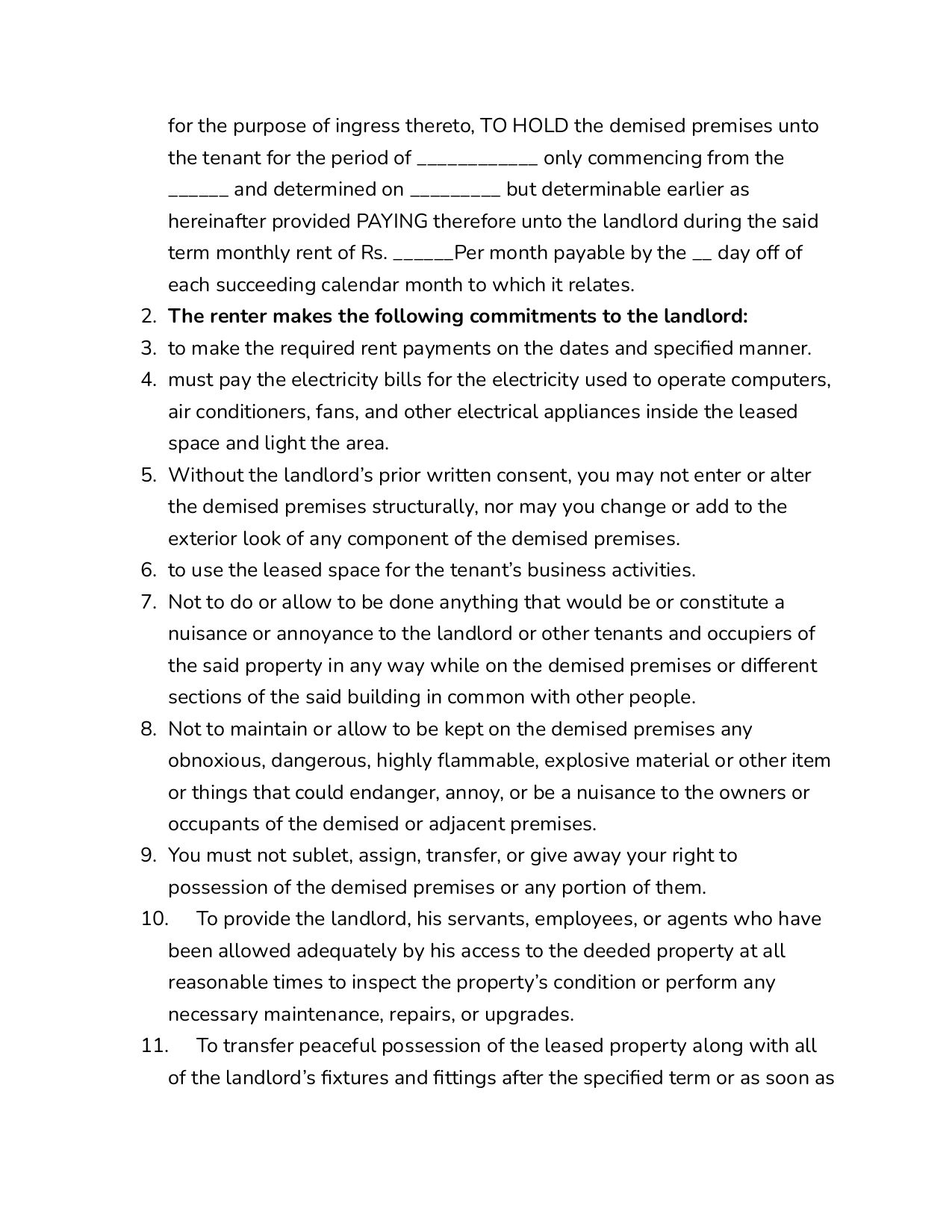
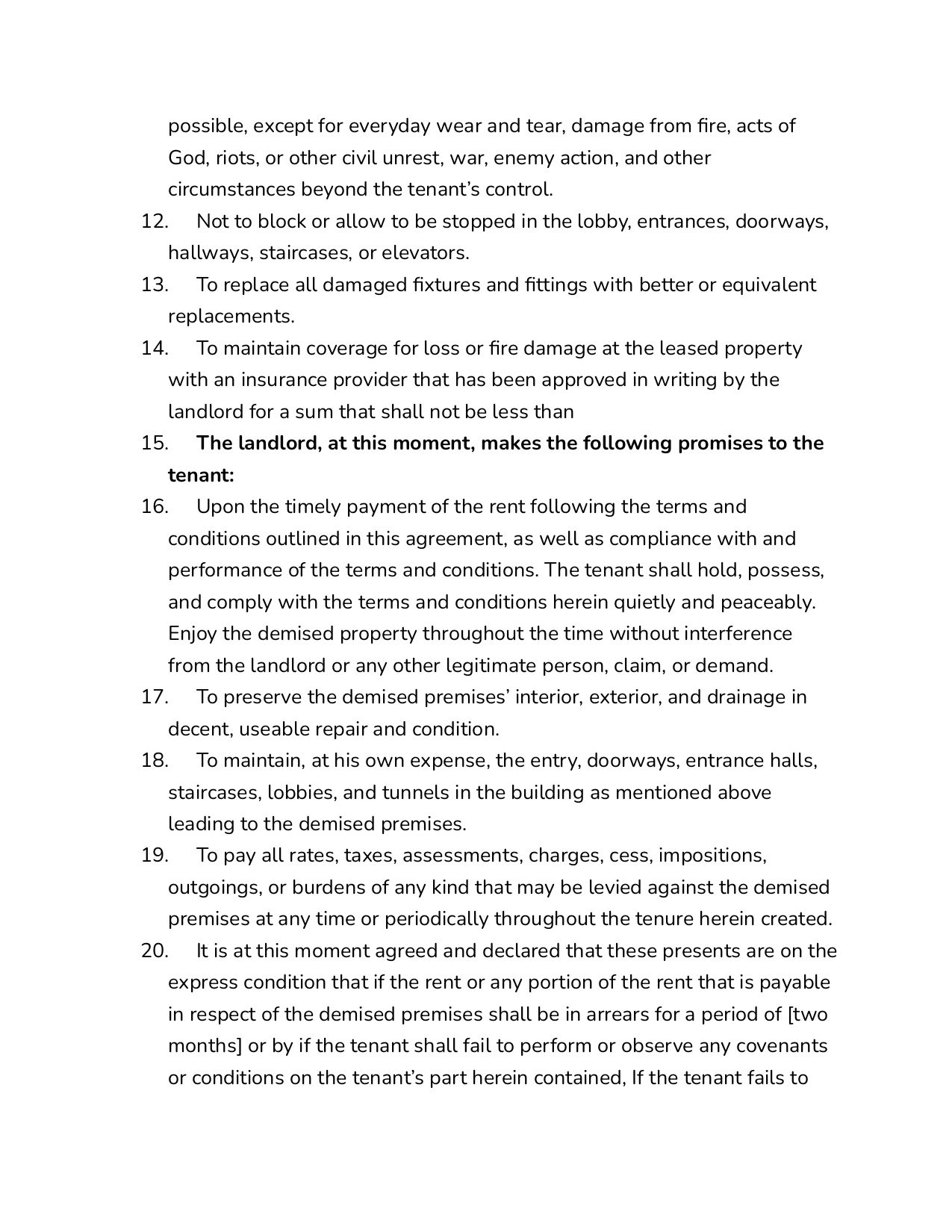
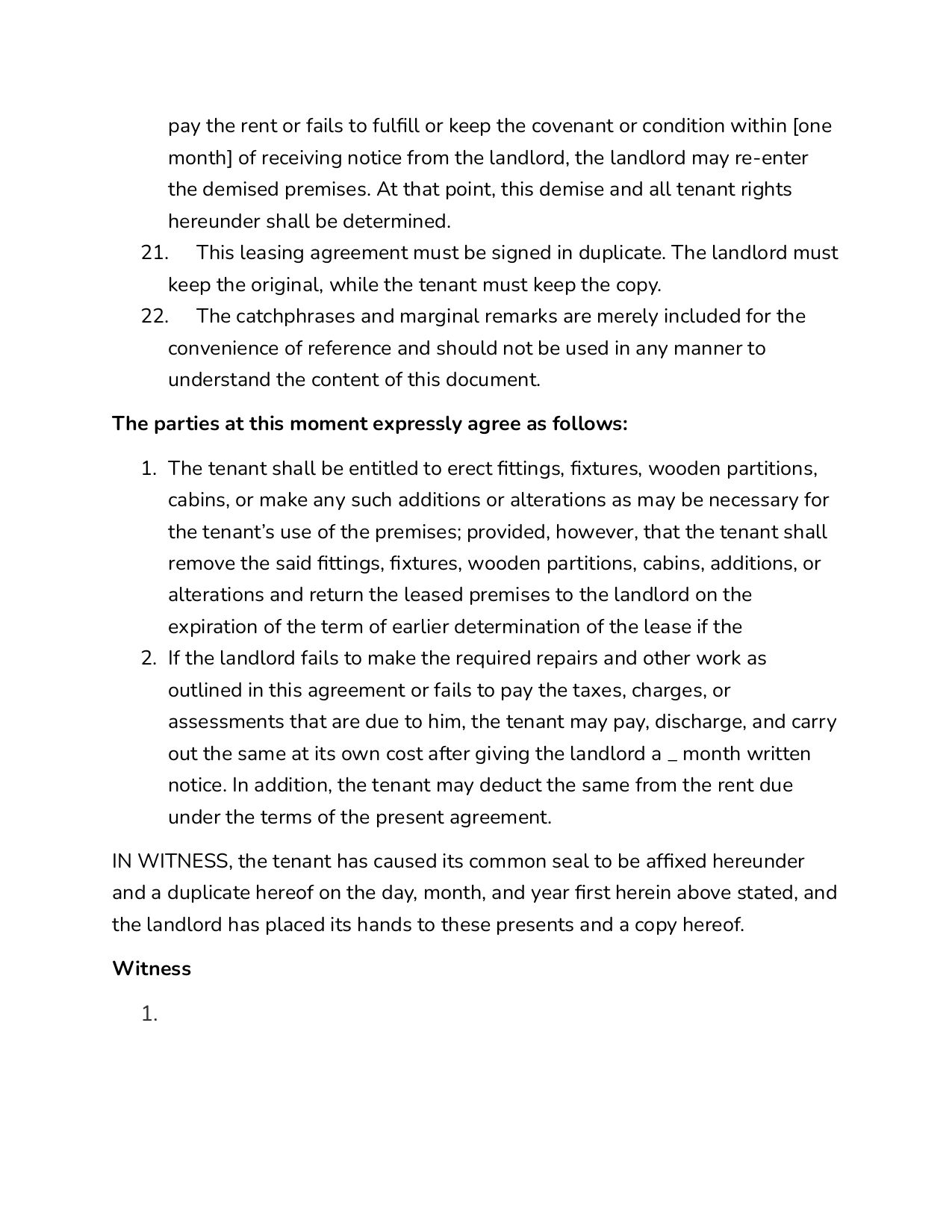
If you're looking to rent a shop click here and fill your requirements
Find Your Ideal Retail Space. Fast!
Present in Mumbai, Navi Mumbai, and Thane.
*Please enter a valid name.
*Please enter a valid phone number.
*Please enter a valid company name.
*Please enter a valid carpet area.
What is a Shop Rent Agreement?
In India, the legal definition of a shop rent agreement is provided under the Indian Contract Act, 1872.
According to the Act, a shop rental agreement is a contract between the owner of a shop (known as the "landlord") and the person who rents the shop (known as the "tenant"). The tenant pays rent to the landlord in exchange for the use of the shop for a specific period of time.
In simple terms, a rent agreement for the shop is a legally binding document that outlines the terms and conditions between a landlord and a tenant for the rental of a shop or commercial space. It defines the obligations and responsibilities of both parties, such as the rent amount, payment terms, duration of the lease, maintenance, and repair of the premises, and other pertinent clauses.
A shop rent agreement serves as legal protection for both parties and helps avoid any potential misunderstandings or disputes that may arise during the lease period.
The agreement also outlines the consequences of any breach of the terms and conditions by either party. The format and contents of a shop rent agreement may vary based on the specific agreement between the landlord and the tenant and the legal requirements in the jurisdiction where the lease is executed.
Types Of Rental Agreements
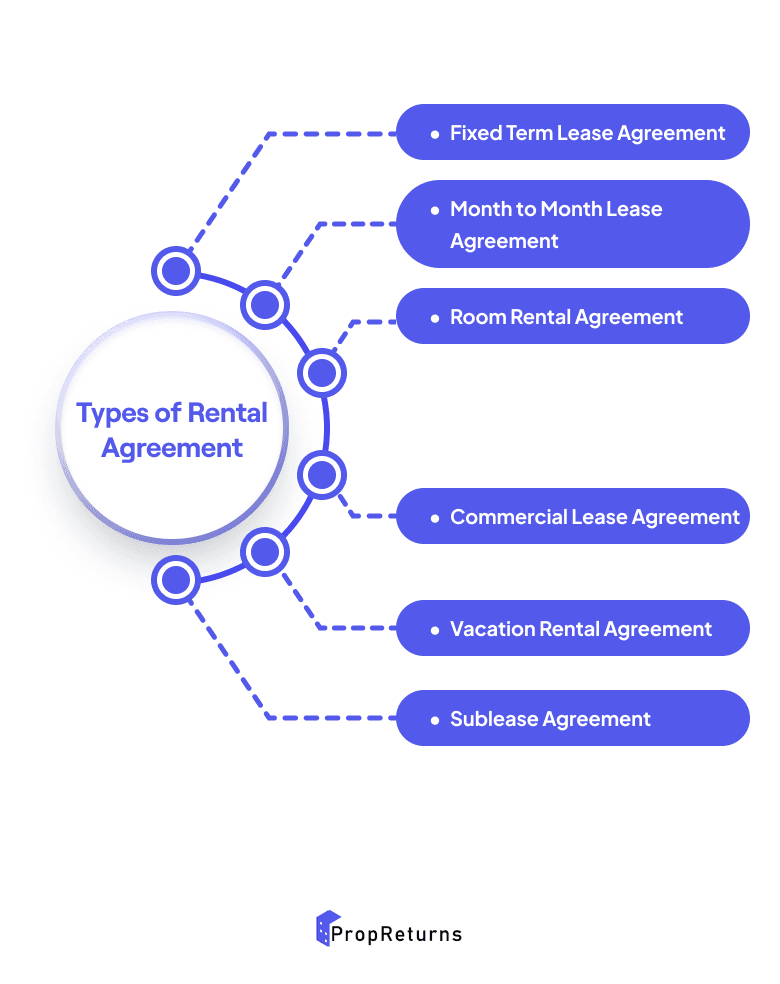
There are several types of rental agreements that landlords and tenants can use to establish a tenancy. These include:
Fixed-term lease agreement: This type of agreement specifies a start and end date for the tenancy, typically lasting for a period of one year or more.
Month-to-month lease agreement: This type of agreement is renewed automatically every month and can be terminated by either the landlord or the tenant with proper notice.
Room rental agreement: This type of agreement is used when a tenant rents a single room within a larger property, such as a house or an apartment, and shares common areas with other tenants.
Commercial lease agreement: This type of agreement is used for renting commercial property, such as office space, retail stores, or warehouses.
Vacation rental agreement: This type of agreement is used for short-term rentals, typically for vacation properties such as cottages, cabins, or vacation homes.
Sublease agreement: This type of agreement allows a tenant to sublet all or a portion of their rented property to another tenant, with the landlord's approval.
Elements To Include In A Shop Rental Agreement
If you're a landlord or a tenant looking to rent out or lease a commercial space, writing a shop rent agreement is an essential step in protecting your interests and avoiding any misunderstandings or disputes.
Here are some key steps to follow when writing a shop rent agreement:
Identify the parties: Begin the agreement by clearly identifying the landlord and the tenant, including their full legal names, addresses, and contact information.
Describe the property: Provide a detailed description of the shop or commercial space being rented out, including the address, floor area, and any other relevant details.
Rent and payment terms: Clearly outline the rent amount and payment terms, including the frequency and mode of payment, any late payment fees, and the security deposit amount and terms.
Lease term: Specify the duration of the lease, including the start and end dates, and any renewal options.
Maintenance and repairs: Detail the responsibilities of both the landlord and the tenant for maintaining and repairing the property during the lease term.
Use of the property: Specify any restrictions on the use of the property, such as prohibited activities or subleasing.
Insurance and liability: Clarify the insurance requirements and liability provisions for both parties in case of any damage, loss, or injury on the property.
Termination and default: Include the provisions for terminating the lease and the consequences of any breach of the agreement by either party.
Signatures: The agreement should be signed by both the landlord and the tenant, as well as any witnesses or notary public, to make it legally binding.
It's always recommended to consult with a legal professional or use a template that complies with the relevant laws and regulations in your jurisdiction when writing a shop rent agreement. This will help ensure that the agreement is enforceable and provides adequate protection for both parties.
Benefits Of Having A Shop Rental Agreement:
Some of the advantages of having a Shop Rent Agreement include:
A clear understanding of terms and conditions: A Shop Rent Agreement clearly outlines the terms and conditions of the rental agreement, including the rent amount, payment terms, lease duration, renewal terms, and other relevant details. This ensures that both the landlord and the tenant are on the same page and can avoid any misunderstandings in the future.
Legal protection: A Shop Rent Agreement is a legally binding document that provides legal protection to both the landlord and the tenant. In case of any disputes or breaches of contract, the agreement can be used as evidence in a court of law.
Rent control: A Shop Rent Agreement can help in controlling the rent amount and other charges. The agreement can stipulate the rent amount, security deposit, maintenance charges, and other expenses. This helps in preventing any arbitrary or unreasonable increases in rent.
Customizable: A Shop Rent Agreement can be customized to meet the specific needs and requirements of both the landlord and the tenant. This flexibility allows both parties to negotiate and agree upon terms that are mutually beneficial.
Establishes a professional relationship: A Shop Rent Agreement helps to establish a professional relationship between the landlord and the tenant. This can lead to a more harmonious and productive working relationship, as both parties know what is expected of them.
Find Your Ideal Retail Space. Fast!
Present in Mumbai, Navi Mumbai, and Thane.
*Please enter a valid name.
*Please enter a valid phone number.
*Please enter a valid company name.
*Please enter a valid carpet area.
Frequently Asked Questions:
What Is The Minimum Lock-In Period?
The minimum lock-in period for a shop rental agreement can vary depending on the terms agreed upon by the landlord and the tenant. Generally, a lock-in period refers to the minimum amount of time that a tenant is obligated to rent the shop before being able to terminate the lease agreement without penalty.
In some cases, the minimum lock-in period may be as short as three to six months, while in other cases it may be one to two years or more. It is important to carefully review the terms of the rental agreement before signing to understand the lock-in period and any other important clauses, such as rent escalation clauses, security deposits, and maintenance responsibilities.
How To Cancel The Rental Contract In India?
The process for canceling a rental contract in India may vary depending on the specific terms and conditions of the contract and the state in which you are located. However, here are some general steps that may be involved in canceling a rental contract in India:
Review the rental contract: Carefully review the terms and conditions of your rental contract to understand the cancellation policy, notice period, and any penalties for early termination. Be sure to check the state-specific laws as well.
Provide notice: If you decide to cancel the rental contract, provide notice to your landlord or property manager in writing, stating your intention to terminate the lease and the date on which you plan to vacate the property. As per Indian law, you need to give at least 1-month notice to your landlord before vacating the rental property.
Negotiate with your landlord: If you are canceling the rental contract before the end of the lease term, you may be subject to penalties or fees. You may be able to negotiate with your landlord to reduce or waive these fees, especially if you have a valid reason for terminating the lease early.
Document the condition of the property: Before you move out of the rental property, document its condition to avoid any disputes with your landlord over the return of your security deposit. Take photographs or videos of the property, and make note of any damages or repairs needed.
Return the keys: Once you have vacated the rental property, return the keys to your landlord or property manager.
Follow up with your landlord: After you have moved out, follow up with your landlord to ensure that any security deposit or refund owed to you is returned in a timely manner.
In case of any disputes or issues with the landlord, you can reach out to a legal professional or a local Rent Control Office for guidance and support. It is always a good idea to consult with a legal professional if you have any questions or concerns about canceling a rental contract in India.
